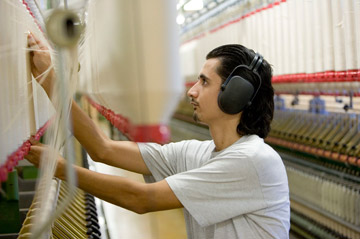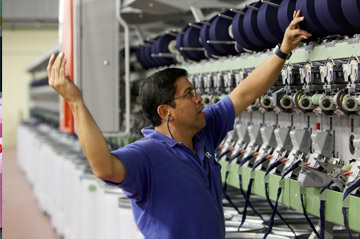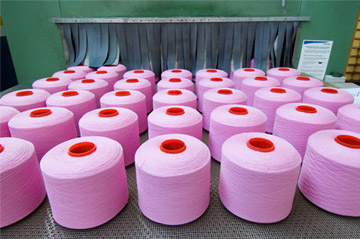‘Sustainable Textile Production (STeP)’ is the new OEKO-TEX® certification system for brands, retail companies and manufacturers from the textile chain who want to communicate their achievements regarding sustainable production to the public in a transparent, credible and clear manner. Certification is possible for production facilities of all processing stages from fibre production, spinning mills, weaving mills, knitting mills to finishing facilities and manufacturers of ready-made textile items. STeP replaces the previous OEKO-TEX® Standard 1000.



Concept
The objective of STeP certification is the permanent implementation of environmentally friendly production processes, optimum health and safety and socially acceptable working conditions. The dynamic further development of the STeP standard and the benchmarks allows certified companies to continuously improve their environmental protection achievements and their social responsibility as well as their efficiency. This in turn enables them to achieve the best possible competitive position on the market.
Advantages for brands and retailers
STeP allows globally operating brands and retail companies to search for suitable suppliers worldwide who meet their demands regarding environmental protection and social responsibility. This enables them to clearly and completely document their joint sustainable commitment to end consumers together with the supply chain.
Advantages for production facilities
Textile and clothing manufacturers can make their production processes much more efficient on the basis of a STeP certification. Our system helps them to determine their company's positioning with regard to sustainability and shows areas for improvement. The independent proof of sustainable production conditions also provides an image boost allowing the companies to open up new markets and supplier relations.
Comprehensive approach – textile-specific criteria
In contrast to other certification systems, which mostly only take into account certain individual aspects of sustainability, STeP allows comprehensive analysis and evaluation with regard to sustainable production conditions. In addition to this, the requirements and criteria of the STeP certification are specifically adapted to the situation in the textile and clothing industry.
To ensure global comparability, the STeP criteria are standardised around the world. They are continually analysed, evaluated and updated, if required (e.g. in view of new market developments, legal regulations and scientific findings).
Competent, independent evaluation
The responsibility for the STeP certification lies with the International OEKO-TEX® Association with its 16 member institutes and representative offices in over 60 countries worldwide. The OEKO-TEX® institutes are accredited, independent textile testing and research institutes with wide ranging competence and long-standing experience regarding the specific conditions in the textile and clothing industry.
Certification
The certification process can roughly be broken down into 7 steps:
- Interested companies contact one of the worldwide OEKO-TEX® institutes (contact offices) with their certification request or they register on the STeP platform.
- OEKO-TEX® provide the company with the access data for the assessment tool.
- The company completes an electronic questionnaire.
- The data is analysed and evaluated by OEKO-TEX®.
- An OEKO-TEX® auditor visits the production facility and verifies the information provided in the electronic questionnaire.
- OEKO-TEX® create a detailed report about the results of the audit and – if the required criteria have been met – issue a STeP certificate to the requesting company.
- After receiving the certificate the company is entitled to communicate its STeP certification to the public and to use it commercially.
Duration of the certification
A period of 3 months is generally required, from the time of application, data collection and data assessment to the audit and the issuing of the certificate. The duration of the actual certification process depends on the individual circumstances in each production facility, though. This includes, for example, whether certifications for individual business areas already exist or how fast the required data for the assessment can be determined and provided.
Certification costs
The costs for STeP certification depend on the size of the company, the test criteria specific to each production stage as well as the extent to which the company has already implemented measures regarding environmental protection and social responsibility. The expense includes support and advice from the OEKO-TEX® institutes during the application, preparation of the assessment, preparation, execution and documentation of the audit, issuing of the certificate as well as a license fee.
Certificate
A STeP certificate is valid for a duration of three years and can subsequently be extended any number of times.
Modular structure
Through modular analysis of all relevant company areas such as management of chemicals, environmental protection, environmental management, health and safety, social responsibility and quality management, the STeP certification allows a comprehensive and reliable analysis of the extent of sustainable management provided by a production facility.
Requirements
The prerequisite for STeP certification is the compliance with certain minimum requirements in the individual company areas. Based on this, the following issues are relevant:
Management of chemicals
- Compliance with the guidelines of a restricted substances list (RSL)
- Introduction of a suitable harmful substances management
- Compliance with the principles of ‘green chemicals’
- Periodical training and further education regarding the handling of the chemicals used
- Obligation for appropriate communication regarding the chemicals used and their risks
- Monitoring the use of chemicals
Environmental protection
- Compliance with the stipulated limit values
- Use of best available production technologies
- Optimisation of production processes
- Efficient use of resources
- Responsible handling of waste, waste water, emissions etc.
- Reduction of the CO2 footprint
Environmental management
- Proof of a suitable environmental management system for targeted coordination and systematic implementation of all environmental protection measures
- Commitment to environmental targets
- Periodic creation of environmental reports
- Appointment of an environmental representative
- Periodic training regarding the implementation of environmental targets and measures
- Implementation of existing environmental protection systems (e.g. ISO 14001)
Social Responsibility
- Ensuring socially acceptable working conditions in the sense of the UN and ILO conventions
- Execution of performance appraisals for employees
- Implementation of existing social standards (e.g. SA 8000)
- Guaranteed training for employees regarding the social issues of an operation
Quality management
- Implementation of a suitable QM system, e.g. in line with ISO 9001 or operational approaches
- Guaranteed traceability, responsibility and appropriate documentation regarding the flow of goods and manufactured products
- Advanced management aspects such as risk management or corporate governance
Health and safety
- Proof of suitable measures to ensure the required health and safety in the workplace (e.g. filter systems, ear protection etc.)
- Guaranteed safety of buildings and production plants (e.g. through constructive measures, escape plans, separation of production areas etc.)
- Risk prevention
- Implementation of existing safety standards (e.g. OHSAS 18001)
Assessment
OEKO-TEX® require numerous data and parameters from the companies to allow adequate evaluation of the sustainability of production facilities. Data collection is web-based and uses an assessment tool. After contact is established or when an application is made to an OEKO-TEX® institute, the companies will receive the required access data, enabling them to enter their information in an online questionnaire and send it to the institute. After evaluation of the data the applicant will receive a detailed report about the result of the assessment.
Scoring
STeP certification encompasses three different levels describing the extent to which the company has achieved sustainable production and working conditions:
- Level 1 = entry level
- Level 2 = good implementation with further optimisation potential
- Level 3 = exemplary implementation in the sense of a best practice example
The STeP certificate shows the following scoring results:
- the sustainability level achieved
- an overall evaluation in per cent
- an individual evaluation of the analysed modules in per cent
The STeP scoring creates more transparency because it allows the sustainability of production facilities along the textile value chain to be compared on all relevant company levels across country borders and beyond legislative regulations. The detailed representation of the assessment results allows a sound definition of the company's positioning with regard to sustainability and illustrates in particular which company areas have further potential for optimisation.
Audits
The information and data provided by the company in the framework of the assessment are analysed and evaluated by OEKO-TEX®. Verification is carried out in the form of an audit of the production facility by the OEKO-TEX® institute in charge.
OEKO-TEX® have a comprehensive internal quality management to ensure globally standardised audit results. This includes, for example, joint training and regular further education of the auditors as well as annual meetings of the technical OEKO-TEX® expert groups.
Verification
In addition to the routine audits in the framework of the initial STeP certification and extension, OEKO-TEX® carry out intermediate audits (compliance audits) as well as unannounced company audits at the production facilities to verify compliance with the required criteria after the certificate has been issued.



